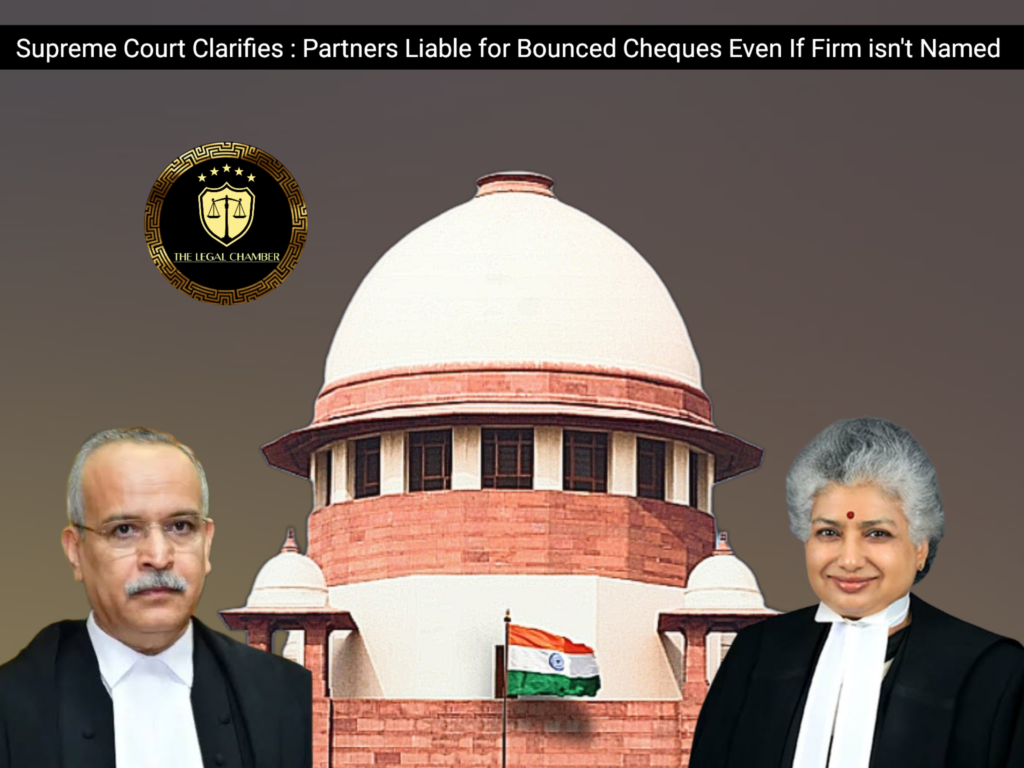
The Supreme Court ruled that in cases under Section 138 of the Negotiable Instruments Act, a partnership firm need not be separately arraigned as an accused if its partners are prosecuted. The notice to partners constitutes notice to the firm, as partners are jointly and severally liable. The Court clarified that unlike companies, partnership firms lack a separate legal identity, making partners directly liable. The judgment distinguishes between vicarious liability (for companies) and joint liability (for firms), upholding the complaint’s validity despite the firm’s omission. The High Court’s order quashing the complaint was set aside.
Facts Of The Case:
The appellant, Dhansingh Prabhu, advanced a loan of ₹21 lakh to the respondents, Chandrasekar and another, who were partners of the firm Mouriya Coirs. To repay the debt, respondent No. 1 issued a cheque for the loan amount from the firm’s account, but it was dishonoured due to the account being frozen. The appellant issued a statutory demand notice under Section 138 of the Negotiable Instruments Act, 1881, to both partners but not to the firm itself. Subsequently, he filed a complaint before the Judicial Magistrate, Pollachi, against the partners but did not implead the firm as an accused. The respondents approached the Madras High Court under Section 482 CrPC, seeking quashing of the complaint on the grounds that the firm was not named in the notice or complaint, violating Section 141 of the Act. The High Court quashed the complaint, holding that since the firm was not arraigned as an accused, the proceedings against the partners were unsustainable. Aggrieved, the appellant appealed to the Supreme Court, arguing that a partnership firm has no independent legal existence, and notice to partners suffices. The key issue was whether the omission to issue notice to the firm or implead it as an accused vitiated the complaint against the partners.
Procedural History:
The case originated with the appellant filing a complaint under Section 138 of the Negotiable Instruments Act, 1881, before the Judicial Magistrate No. II, Pollachi, after a cheque issued by the respondent-partner of Mouriya Coirs was dishonoured. The trial court took cognizance of the matter, following which the respondents approached the Madras High Court under Section 482 of the CrPC, seeking quashing of the complaint. The High Court allowed their petition, holding that since the partnership firm was not issued a statutory notice or arraigned as an accused, the complaint against the partners was unsustainable. Aggrieved by this decision, the appellant filed a special leave petition before the Supreme Court, which granted leave and admitted the appeal. The apex court examined whether the High Court erred in quashing the complaint solely due to the non-issuance of notice to the firm and its omission as an accused. Ultimately, the Supreme Court set aside the High Court’s order, restoring the complaint and clarifying that partners of a firm are jointly and severally liable, making the notice to them sufficient for legal proceedings. The case was remanded to the trial court for disposal in accordance with the law.
READ ALSO : Land Acquisition & Rehabilitation : Oustees Must Follow 2016 Policy, Not 1992 Rates for Plot Allotments
Court Observation:
The Supreme Court made several key observations while delivering its judgment. It emphasized that a partnership firm lacks a separate legal identity distinct from its partners under the Indian Partnership Act, 1932, making partners personally liable for the firm’s obligations. The Court distinguished between companies (which have independent juristic personality) and partnership firms (which are merely compendiums of partners), noting that vicarious liability principles applicable to companies don’t strictly apply to partnerships.The Bench observed that since partners are jointly and severally liable for firm debts, statutory notice issued to individual partners satisfies the requirement under Section 138 of the Negotiable Instruments Act, even if the firm isn’t separately notified. The Court clarified that while Section 141 includes firms within the definition of “company” for procedural convenience, this legal fiction doesn’t alter the fundamental nature of partner liability in partnership firms.Significantly, the judgment held that non-joinder of the partnership firm as an accused doesn’t invalidate proceedings against partners, as their liability is primary rather than derivative. The Court noted this interpretation aligns with commercial realities and prevents technicalities from defeating substantive justice in cheque dishonor cases involving partnership firms.
Final Decision & Judgement:
The Supreme Court allowed the appeal and set aside the Madras High Court’s order quashing the complaint. It held that in cases involving partnership firms under Section 138 of the Negotiable Instruments Act, the statutory notice to individual partners satisfies legal requirements even if the firm itself is not separately notified or arraigned as an accused. The Court restored the complaint (STC No.1106/2022) to the file of the Judicial Magistrate No. II, Pollachi, directing it to proceed with the trial in accordance with law. The judgment clarified that partners of a firm are jointly and severally liable for the firm’s obligations, and their prosecution can proceed independently of the firm being named as an accused. This decision reaffirms the principle that technical deficiencies in impleadment should not defeat substantive justice in cheque dishonor cases involving partnership firms.
Case Details:
Case Title: Dhanasingh Prabhu vs. Chandrasekar & Another Citation: 2025 INSC 831 Criminal Appeal No.: Arising out of SLP (Crl.) No. 5706 of 2024) Date of Judgment: July 14, 2025 Judges/Justices Name: Justice B.V. Nagarathna & Justice Satish Chandra Sharma
Download The Judgement Here